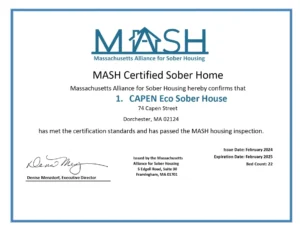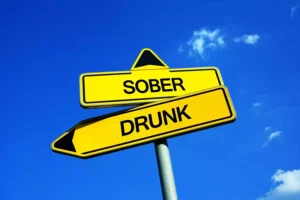How Long Does It Take to Detox from Alcohol? Timeline and More

This includes both psychological (emotional) triggers that tempt you to drink as well as physical sensations that make you want to drink. But Dr. Streem knows that it can be hard to recognize signs of alcohol abuse in ourselves. Often, people with alcohol use disorder find that other people in their lives spot their addiction long before they do. Laying it all out in black and white can take time and some serious self-examination.

Recognize the signs of alcohol use disorder
When you’re having a good time, you find it hard to stop, especially in the company of friends having the same amount. To stop drinking alcohol, you first need to understand your relationship with drinking. From there, you may need social support, consistent self-care, and new routines that can help redirect your mind.
Alcohol Detox for Withdrawal
It is possible to get treatment and live a healthier life with a better relationship with alcohol. A self-detox involves detoxing from alcohol at home without medical support or supervision. It allows you to manage alcohol withdrawal symptoms in the comfort of your https://ecosoberhouse.com/ own home with little cost. If you’ve been drinking heavily for a long time and think you might experience withdrawal symptoms, it’s best to talk with a medical professional before you begin a taper. They can help you decide if tapering is the safest option for you.
Does everyone experience the 4 stages of alcohol withdrawal syndrome?
Remove all alcohol from your home or ask a friend or family member to do it for you. This includes beer, wine, and liquor, as well as products that contain alcohol such as rubbing alcohol and vanilla extract. During an exam, they’ll look for other medical conditions to see if they could be to blame.
For people who experience mild alcohol withdrawal symptoms, there are safe ways to detox at home. People who experience tremors, shakes or confusion when they quit drinking should consider medically supervised detox. You should talk to a doctor about the safest way to detox if you experience any withdrawal symptoms when you stop drinking. You can expect to experience alcohol withdrawal symptoms during the acute phase of alcohol detoxification. These symptoms can range from mild symptoms such as headache and anxiety to more serious alcohol withdrawal symptoms such as tremors, hallucinations, and seizures.
- Avoid taking prescription drugs that your doctor hasn’t prescribed to you.
- Many people with alcohol use disorder struggle with dehydration and nausea during withdrawal.
- This can sometimes cause unpleasant withdrawal symptoms, and these symptoms can make it hard to stick with your recovery plan.
- Withdrawal symptoms can quickly go from a bad hangover to a serious medical situation.
- This allows your body to withdraw from alcohol and stop alcohol use entirely gradually and safely.
- Detoxing from alcohol can be an emotionally stressful experience.
- Alcohol withdrawal can range from very mild symptoms to a severe form, known as delirium tremens.
- The craving for alcohol may be a persistent challenge during and after withdrawal.
- If someone is malnourished, the body won’t have the energy it requires to recover from alcoholism.
- Having little to no access to alcohol can help you stop drinking.
- However, try not to have too many firm expectations, as symptoms can continue for multiple weeks in some people.
You’re more likely to stick with a detox program when you have lots of help. There are many support options available that can help guide you through alcohol withdrawal, as well as abstaining from alcohol after withdrawal. However, try not to have too many firm expectations, as symptoms can continue for multiple weeks in some people. Individuals should be prepared to be uncomfortable during this period and have medical help available if needed. This is the period in which delirium tremens is most likely to occur, which requires immediate medical attention. One factor to remember is that the discomfort of withdrawal is only temporary.

Alcohol Withdrawal Stages and Severity
However, it’s important to consult a healthcare provider before starting any supplements, as they can advise on the most appropriate regimen based on individual health needs. One important thing to do when addressing alcohol withdrawal is to distance yourself from enablers and any drinking advocates alcohol detox side effects that are in your life. They often will minimize your addiction by telling you it’s not that big of a deal. It’s best to avoid these people during and following withdrawal. Talk with a healthcare professional if you’re concerned you may experience detox symptoms when quitting drinking or cutting back.

Medications Used During Alcohol Detox

The presence of co-occurring disorders can make alcohol detox more severe, complicated, and prolonged. Treatment centers that specialize in dual diagnosis are best equipped to handle such patients. It’s important to get professional support if you are trying to cut down on your drinking. Instead, gradually reduce the amount you drink every day over a period of several weeks. A good rule of thumb is to reduce your drinking by about 10% every couple of days. So, if you drink 10 beers a day, reduce it to 9 beers on day 2 of your alcohol detox and so on.
Inpatient usually offers more services, but it tends to cost more. Outpatient is a less-expensive option that’s generally safe and effective for people with mild or moderate alcohol withdrawal. It works best if your physical and mental health is good, your home is stable, you have support at home, and you don’t have a long history of problem drinking.
Outpatient Treatment
If you have alcohol use disorder and want help, a healthcare provider can guide you to resources and rehabilitation programs to help you quit. Know that your provider will be there to support you, not to judge you. Most people with mild to moderate alcohol withdrawal don’t need treatment in a hospital. But severe or complicated alcohol withdrawal can result in lengthy hospital stays and even time in the intensive care unit (ICU). Alcohol withdrawal (alcohol withdrawal syndrome) is a range of symptoms that can happen if you stop or significantly reduce alcohol intake after long-term use. Alcohol withdrawal causes a range of symptoms when a person with alcohol use disorder stops or significantly decreases their alcohol intake.
About the author